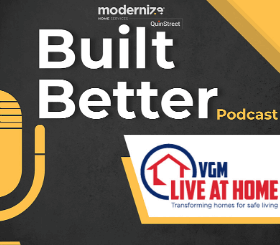While one-off projects can add to the bottom line in your renovation business, the secret to success lies in the relationships you build with homeowners. One of the best things you can do as a contractor is focus on life-long professional relationships with each customer. Your commitment to quality, paired with consistent communication, sets the stage for business growth in the future.
Being proactive with your outreach and marketing will help stack your pipeline for future projects. When a client trusts your work, they return to your business, and help send referrals your way. The key to opening the door for referrals is to deliver quality results and maintain ongoing communication— even after the project is complete.
Leverage Communication to Boost Referrals
While basic communication is essential, you need to over-deliver if you want to grow your business. Clients like knowing what is happening through all stages of the project. When you are proactive with communication, it sends a message that shows how committed you are to building a solid relationship with each person.
Look for ways you can loop the homeowner in through all stages of the project:
When cabinets arrive, call the client to share the good news about the installation timeline.
Send a quick text with a photo of the newly laid bathroom tile so the client can see the progress.
Send weekly recap emails of progress made and identified next steps
Not only do regular updates boost the excitement and anticipation for every client, but they are also essential for managing the expectations of each person. Share the good news and the bad, helping to off-set the frustration if there are shipping delays or a change in the construction schedule.
6 Tips for Effective Communication
Good communication helps ensure both parties are on the same page at all times. Once you get the hang of it, over-communicating can become a natural part of doing business. Here are a few tips to help:
- Meet Regularly: Schedule weekly meetings to talk to the homeowners about current updates on their project.
- Create a Client To-Do List: At the end of every meeting, send the homeowner with a detailed list of their tasks for the week. Be specific in your instructions. For example: Pick out your faucet by Thursday and email me your choice.
- Detect Trends: Over time, you will notice similar themes coming up in your conversations with each client. Pay attention to these themes.. For example, if your clients often ask about the differences between custom and stock cabinetry, then you can create a document comparing the options to pass along to anyone who asks. Do the work once so you have resources to share with others in the future.
- Be Proactive: Address problems or delays quickly and directly. Procrastinating difficult conversations only makes things worse. A proactive response shows the client you care about their satisfaction, which builds trust over the course of the project.
- Adopt Good Listening Skills and Body Language: Learn good communication skills and practice them in every conversation. Show that you are actively listening by making eye contact, asking questions, and resisting the urge to interrupt your customer.
- Be Clear from the Beginning: You can manage expectations by building a buffer into your schedule. Even though it might look good to share a best-case-scenario timeline for project completion, it is better to quote a realistic timeline. Then, communicate any changes that may happen along the way.
One of the greatest benefits of good communication is that you are increasing perceived value for every person you meet. You can establish yourself as an expert in the industry, and deliver excellent results that clients want to share with their friends and family.
These communication tips build solid relationships with each of your customers. As each homeowner sees your confidence and commitment to the project, they will gain an appreciation of the quality of work you offer. Genuine relationships lead to referrals, which will help your business grow in the future.

















